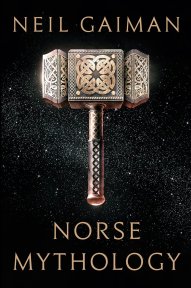I received a copy of this book from the publisher in exchange for an honest review. But the hardcover is STUNNING and I must have that too…
 I feel like I can’t really start this review until I come clean about my experience reading Neil Gaiman. It’s a story fraught with DNFs and secret shame. And because this intro is going to take a couple of paragraphs and you likely just want to know what I thought, I’ll tell you up here that it was great. Go read it.
I feel like I can’t really start this review until I come clean about my experience reading Neil Gaiman. It’s a story fraught with DNFs and secret shame. And because this intro is going to take a couple of paragraphs and you likely just want to know what I thought, I’ll tell you up here that it was great. Go read it.
As a librarian, reader and human being, Gaiman is a bit of a superhero. In my mind he’s like Margaret Atwood and countless other authors who champion public libraries, reading, and more generally, the rights of all individuals to simply exist as they are in a free and democratic society. He’s just a lovely human being by all counts.
Which brings me to my shame. I have finished exactly one previous Gaiman novel (The Ocean at the End of the Lane) but haven’t had a lot of success with his books in general. I always want to love them and be part of that group of hardcore fanboys and fangirls, but I just haven’t been able to get there. I feel this odd sense of excitement whenever he publishes something new, but that doesn’t really translate into me buying/borrowing and reading the thing.
I had this book ages ago and didn’t pick it up until it was released earlier this month. So you might be wondering why I bothered at all. Frankly, I always think this will be the Gaiman that gets me and I will fall madly involve with his work. And this book as a physical item is just fabulous. The cover is everything I’ve ever wanted in a book cover, and if you think we don’t judge books by their cover, you’re just wrong. (Sorry. But it’s true.) So I requested the book, stared at the cover, and then finally, FINALLY, read it.
And we’re back into a regular review. Norse Mythology is…exactly what it says it is. It’s a retelling of the Norse myths with all of the characters and places we grew up with: Odin, Thor, Loki, the Frost Giants, Midgard and Ragnarok. And so many more. Gaiman presents these as a complete story, but each chapter reads like a short story that could stand independently. It’s as much a collection of tales as it is a novel, and I’ve seen it called both in blurbs and reviews. On the face of it, it’s a straightforward presentation of stories that we might already be familiar with. But Gaiman has an ability to write about a thing and really give you a sense of time and place that is both familiar and unique. He’s not just rehashing stories for the sake of it. He has said he feels a deep connection to these stories and as a reader, that really comes across. He’s adding something here and making a real contribution to our long history of story-telling.
It turns out that I don’t have a lot to say really in terms of a “review” because the book just…is. It’s there and it’s brilliant and if the subject sounds appealing to you, you should read it. The more I try to write reviews and think about books for longer after I finish them, the more I think that all reviews should be short. Did you like the book? Would you recommend it to others? Reading is so subjective, and if I write a rave review because I loved the book, it’s no guarantee that you will. And I have a hard time condemning a book because I know there will be readers out there who really connect with it.
This blog exists largely to review books. Posting reviews in public places/having some ability to promote the book is why publishers agree to give you the thing (not that I think you HAVE to review every book given to you) and so the blog continues. As a public librarian with some purchasing power, that’s primarily where the impact of galleys is felt for me, but I think it’s also important to contribute to an online conversation. And with that said, I will continue to try to write coherent and fair reviews here. They just might be shorter than expected at times.